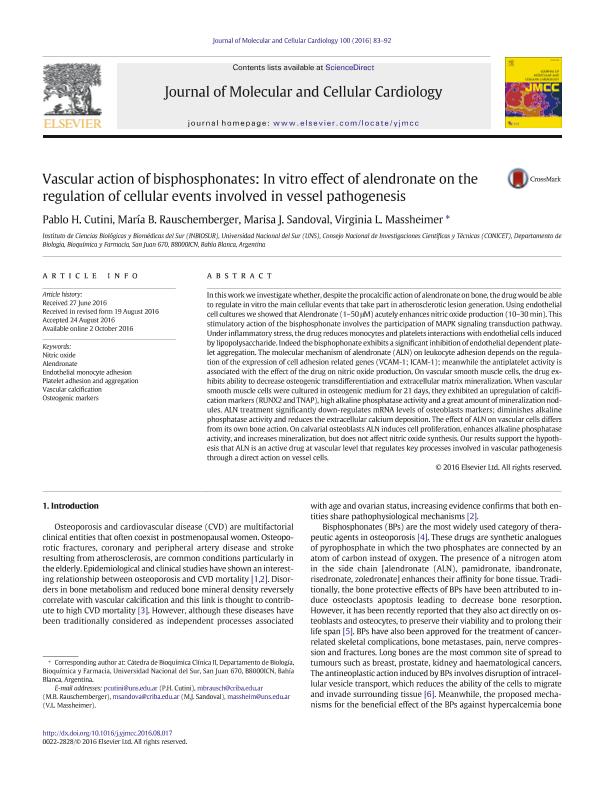Artículo
Vascular action of bisphosphonates: In vitro effect of alendronate on the regulation of cellular events involved in vessel pathogenesis
Cutini, Pablo Hernan ; Rauschemberger, María Belén
; Rauschemberger, María Belén ; Sandoval, Marisa Julia; Massheimer, Virginia Laura
; Sandoval, Marisa Julia; Massheimer, Virginia Laura
 ; Rauschemberger, María Belén
; Rauschemberger, María Belén ; Sandoval, Marisa Julia; Massheimer, Virginia Laura
; Sandoval, Marisa Julia; Massheimer, Virginia Laura
Fecha de publicación:
11/2016
Editorial:
Academic Press Ltd - Elsevier Science Ltd
Revista:
Journal of Molecular and Cellular Cardiology
ISSN:
0022-2828
Idioma:
Inglés
Tipo de recurso:
Artículo publicado
Clasificación temática:
Resumen
In this work we investigate whether, despite the procalcific action of alendronate on bone, the drug would be able to regulate in vitro the main cellular events that take part in atherosclerotic lesion generation. Using endothelial cell cultures we showed that Alendronate (1–50 μM) acutely enhances nitric oxide production (10–30 min). This stimulatory action of the bisphosphonate involves the participation of MAPK signaling transduction pathway. Under inflammatory stress, the drug reduces monocytes and platelets interactions with endothelial cells induced by lipopolysaccharide. Indeed the bisphophonate exhibits a significant inhibition of endothelial dependent platelet aggregation. The molecular mechanism of alendronate (ALN) on leukocyte adhesion depends on the regulation of the expression of cell adhesion related genes (VCAM-1; ICAM-1); meanwhile the antiplatelet activity is associated with the effect of the drug on nitric oxide production. On vascular smooth muscle cells, the drug exhibits ability to decrease osteogenic transdifferentiation and extracellular matrix mineralization. When vascular smooth muscle cells were cultured in osteogenic medium for 21 days, they exhibited an upregulation of calcification markers (RUNX2 and TNAP), high alkaline phosphatase activity and a great amount of mineralization nodules. ALN treatment significantly down-regulates mRNA levels of osteoblasts markers; diminishes alkaline phosphatase activity and reduces the extracellular calcium deposition. The effect of ALN on vascular cells differs from its own bone action. On calvarial osteoblasts ALN induces cell proliferation, enhances alkaline phosphatase activity, and increases mineralization, but does not affect nitric oxide synthesis. Our results support the hypothesis that ALN is an active drug at vascular level that regulates key processes involved in vascular pathogenesis through a direct action on vessel cells.
Archivos asociados
Licencia
Identificadores
Colecciones
Articulos(INBIOSUR)
Articulos de INSTITUTO DE CIENCIAS BIOLOGICAS Y BIOMEDICAS DEL SUR
Articulos de INSTITUTO DE CIENCIAS BIOLOGICAS Y BIOMEDICAS DEL SUR
Citación
Cutini, Pablo Hernan; Rauschemberger, María Belén; Sandoval, Marisa Julia; Massheimer, Virginia Laura; Vascular action of bisphosphonates: In vitro effect of alendronate on the regulation of cellular events involved in vessel pathogenesis; Academic Press Ltd - Elsevier Science Ltd; Journal of Molecular and Cellular Cardiology; 100; 11-2016; 83-92
Compartir
Altmétricas



